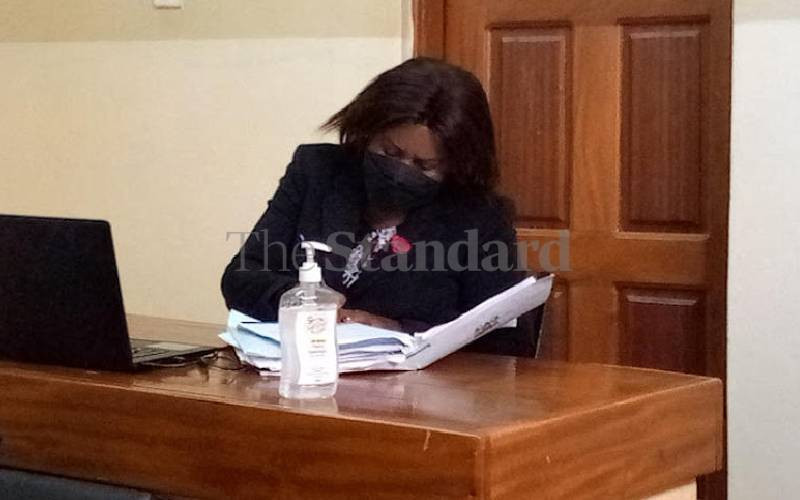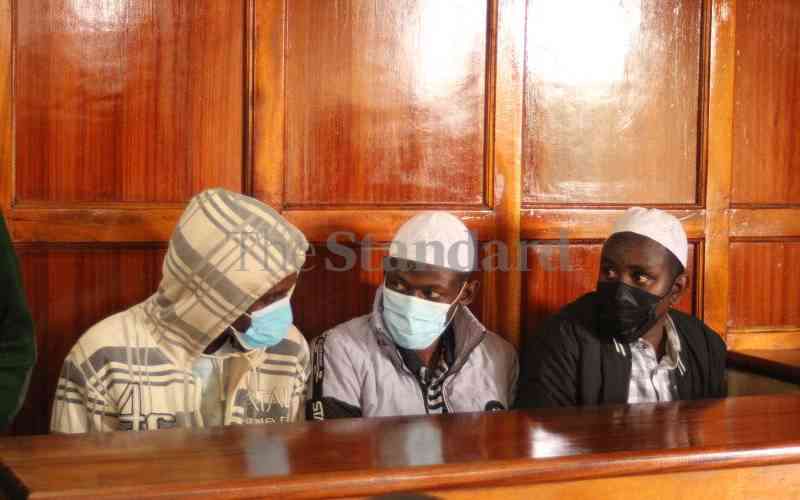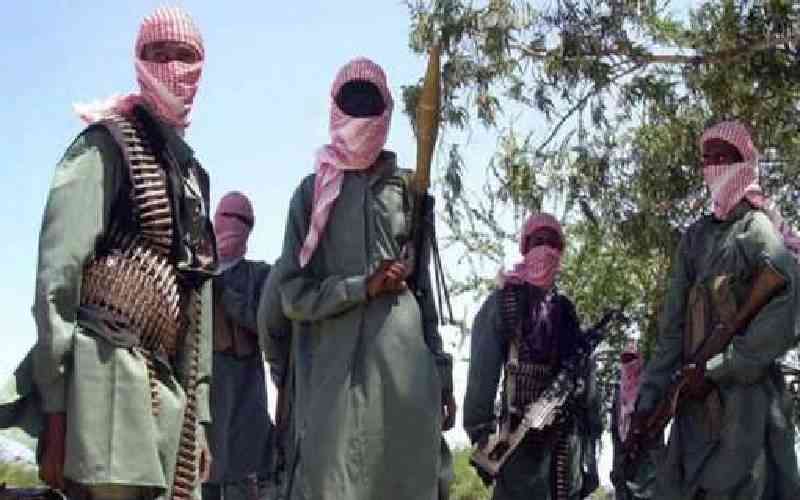 |
|
Police arrest youth during the raid on Masjid Musa in Mombasa. [PHOTO: FILE/ STANDARD] |
By DANIEL WESANGULA
MOMBASA, KENYA: The past three years have been bittersweet for not only the tumultuous Mombasa city, but for Kenya’s coastal region. Violent confrontations between residents and security forces have tarnished the region’s reputation of hospitality that has over decades been carved off an economy built around a now struggling tourism industry.
Mombasa has been wooed from several directions by unlikely suitors. The suitors have come in attractive packages — militant groups, separatist movements as well as radical preachers whose words are balm to the aching ears of the many who feel disadvantaged by a series of unfortunate events they say have left them marginalised.
Everyone has an opinion on Mombasa. Journeymen, natives, immigrants. Even those who have never experienced the humidity of Kenya’s oldest city have a thing or two to say about it. The views are as diverse as the voices, but a convergent point of the outlandish, the factual and the romantic views of this bedrock of ancient Swahili civilisation and gateway to Kenya’s modern tourism industry is marked by one thing; they all agree that the city and the whole Coastal region is at a crossroad.
“Mombasa is on the runway of change. It either takes off smoothly towards the skies of tolerant cosmopolitanism or crashes bursting out into flames that will need more than Government rhetoric or the forceful baton of the dreaded General Service Unit to put out,” psychology professor Halimu Shauri of Pwani University told The Standard on Sunday.
Blow up
“Did you hear? Just yesterday they shot a policeman in Ukunda and took his G3 rifle,” Jacktone Owallo whispers. He is a journeyman; a mechanic who is in Mombasa to collect his boss’s truck which broke down on its way to Nairobi from the port.
“This place will just blow up one day,” he says with evident conviction.
Abubakar Shariff Ahmed is a man who commands a certain following amongst Mombasa’s disenfranchised. His followers call him Makaburi. His influence is thought to be so wide and far reaching that two years ago the United States designated him a terrorist.
“Abubaker Shariff Ahmed is a leading facilitator and recruiter of young Kenyan Muslims for violent militant activity in Somalia,” a Security Council statement said.
“He provides material support to extremist groups in Kenya (and elsewhere in East Africa). Through his frequent trips to Al Shabaab strongholds in Somalia, including Kismayo, he has been able to maintain strong ties with senior Al Shabaab members.”
Makaburi has an amiable face. No mark that screams out terrorist.
He looks calm at first sight. Dressed in a white Kanzu and a wallahi holding back white hair peeping from underneath. His white beard moves up and down with every word he utters.
But when he speaks, anger and pain, escape his slightly filled out face and his voice mirrors someone who firmly believes he and his people are the victims of unwarranted State-sanctioned persecution.
“Wenye radicalisation ni nani?” he asks during an interview. “People are asking the wrong question on why the youth are radicalised. The question should be why a Government would target a specific mosque,” he says.
Stay informed. Subscribe to our newsletter
He says the raids on Masjid Musa are just excuses by the government to gloss over issues of poverty, and lack of opportunities for the coastal people.
“And when they keep talking about radicalisation they want to isolate us from the country. They want everyone to think of us as those intolerant guys,” Makaburi adds. “But we will continue to ask for our rights, even if it is through the podiums in our mosques.”
He has rubbished reports that extremists have been using the mosque to recruit, even after the death of the mosque’s Imam Sheikh Aboud Rogo in August 2012.
“That is nonsense. If I want to recruit will I be foolish enough to do so at a mosque filled with informers and the message broadcast loudly on speakers?” he asks.
Every so often, a young man recognises his presence and shakes his hand with a slight bow of the head. Masjid Musa has been identified by the Government as a hotbed for radical preaching and a recruitment centre for Al Shabaab.
“A mosque is just a building. Does it speak? Does it point someone to a different direction? All this upheaval is as a result of the odds our people are living against. Am I the cause of unemployment? Have I made sure indigenous coastal people have been dominated by other tribes in virtually all aspects of life? Does the mosque bring poverty?” he asks.
Official Government statistics put the city’s poverty rate at 37 per cent, a figure residents say does not represent the reality on the ground.
Other counties within the larger Coast region post grimmer figures. Tana River, Malindi and Kwale all have poverty rates above 75 per cent.
Kilifi stands at 68 per cent and Lamu at 31 per cent.
“Those numbers do not matter. The only statistic I need to be aware of is the 10 families around me that go to bed hungry almost every night,” says Mombasa Republican Council (MRC) secretary general Randu Nzai.
“And we have valid reasons to say that. What do we have here? Nothing. Yet we can get everything from the land our ancestors were born in,” he says.
For the Masjid Musa faithful, unemployment and unfair persecution may be a factor for their agitation. For Mr Nzai and the MRC, land remains the major issue.
Violence
“Recently, they came to give people titles. How many of them were people from here? How many are still chasing title deeds yet when an outsider comes to buy government land he gets his paperwork in weeks. Tell me where is the justice in that,” says Nzai.
He claims that most people got title deeds for smaller pieces of land than what they applied for.
“Someone was entitled to 10 acres, and then they get three or four. Where is the rest?” he says.
But Nzai’s fight for local land ownership could be an exercise infutility. Life has become expensive and the only asset many Giriama people have is ancestral land. Literacy levels are low and school has for successive generations not been a priority for the community.
During the enquiry into the Tana River violence, high illiteracy levels were seen as a catalyst for the Tana violence.
“The population in Tana County is largely considered challenged in matters of education…secondary school enrollment is at 5.5 per cent for the entire county and it is ranked last countrywide,” the commission said. Witnesses told the commission that majority of those involved in the chaos were youths, mostly in their teens, with basic or no formal education.
So when push comes to shove, the only asset in their possession is sold off. Since poverty cuts across the entire society, chances are that the land will most likely be bought by the outsider that has come to be loathed. A bitter-sweet pill that must be swallowed to ensure survival and continuity.
A walk through his village shows traditional homesteads with mud houses and makuti-roofed houses shoulder to shoulder with freshly laid barbed wire demarcating new buyers. Concrete walls have also come up. Opulent villas stand next to dejected shacks where families sleep under government-issued mosquito nets in full glare of the moon and the stars.
Change is in the air and one way or another the indigenous population needs to adapt. Adapt, particularly to the unquenchable thirst of land that drives enterprising upcountry people wherever they go and continuity.
“It is a go ye forth and conquer mentality. It is a free world where enterprise is encouraged,” Sociology professor at Kilifi’s Pwani University Halimu Shauri says. “They will be forced to compete… but they are starting at a disadvantage.”
Secession
It is in Kilifi where graffiti on shop walls boldly proclaim Pwani si Kenya. Is secession and promoting indigenous people’s enterprise through some sort of affirmative action a solution?
“It is a solution,” Nzai says and proceeds to give a foggy explanation. Who, within the region, are the owners and who are the outsiders? A huge population within the region may historically be from elsewhere, but is indigenous by birth. Since independence, at least 16 settlement schemes have been started within the region occupied by inhabitants from all over the country who can equally claim to be part of Pwani.
Approximately 60km from Malindi is the Mpeketoni-Lamu Junction. After a 30km drive on an all weather road is a diversion off the main Lamu Road that leads to Mpeketoni town.
Originally, Mpeketoni and its surroundings were inhabited by the Bajuni and the hunters and gatherers tribe of Wasanye. In the early 1970s Mpeketoni was transformed into a settlement area for landless Kenyans.
Most of those who settled there were Kenyans from upcountry who had allegedly been living in Tanzania but decided to return home due to changing political climate.
“Here we farm and we run businesses. We have been doing so for as long as I can remember,” Tabitha Kiarie says. She has a large farm on which she grows watermelon and passion fruits as well as mangoes. She also owns a pub within the town centre. A cousin runs the farm, another manages the pub. She has just recruited new waiters and waitresses, all relatives.
She says it is just a matter of time before they have their own representing them. “At least we have an MP in Lamu,” she adds.
In September 2012, Mpeketoni was home to internally displaced people from the Tana River violence that pitted the Pokomo against the Oromo. Hundreds of lives were lost in the orgy of violence.
“A big part of course was a strain in resources within Tana River,” former Garsen MP Danson Mungatana says, “and bad politics”. Another amorphous term bandied around by leaders who want to play it safe.
To date, there have been no additional resources in the region nor proof of a different pot of politics being practiced. The status quo remains and the peace continues to hold for now.
“But the resources continue to shrink further,” Nzai says.
Population numbers of the Bajuni and Wasanye in Mpeketoni continue to dwindle as they are swallowed up through intermarriage with other communities. “They feel suffocated. To live in your home and own nothing is a hard thing to do,” Nzai says.
“Disquiet is all over the region and if government does not address this, the people will embrace anything that will give them hope. For them, it is better to die on their feet than live on their knees,” says human rights activist Khalid Hussein of NGO Haki Africa.
“Our leaders have failed for many years… they have failed to address these unique questions at the Coast… major companies are opening up within the region... we applaud the investment but when 95 per cent of employees come from outside your region of operation, what are you telling the locals? 60 per cent of the titles in Mombasa are held by people from outside the county. Really what are you telling our people?” he asks.
On a Thursday afternoon after the Asr prayers, Makaburi walks out of Masjid Musa, eyes teary.
“You can still smell the teargas inside,” he says. “Even when we pray, we are reminded of the injustice we have faced for centuries and continue to face.” He pauses as he greets a few people and dishes out advice.
“The sad part is that even our president cannot take time to console with the families of those we lost in the violence. He is only concerned about this radicalisation thing. Is the death of seven people a lesser tragedy simply because they were Muslim? You tell me.”
Another worshipper steps out of the mosque with reddened eyes. Pockets of acrid tear gas still rise from the surrounding dust whenever a gust of wind blows.
The air, by its foulness, remains a constant reminder that confrontation between these two sides of the same coin is never far away. The sporadic violence is like a sneeze, while the grumblings of the Coast residents are akin to a constant tickle up Mombasa’s nose. And she can only hold off the inevitable for so long.
The only question that remains is what will happen when she sneezes again. Will there be relief or will her neighbours catch a cold?
 The Standard Group Plc is a
multi-media organization with investments in media platforms spanning newspaper
print operations, television, radio broadcasting, digital and online services. The
Standard Group is recognized as a leading multi-media house in Kenya with a key
influence in matters of national and international interest.
The Standard Group Plc is a
multi-media organization with investments in media platforms spanning newspaper
print operations, television, radio broadcasting, digital and online services. The
Standard Group is recognized as a leading multi-media house in Kenya with a key
influence in matters of national and international interest.
 The Standard Group Plc is a
multi-media organization with investments in media platforms spanning newspaper
print operations, television, radio broadcasting, digital and online services. The
Standard Group is recognized as a leading multi-media house in Kenya with a key
influence in matters of national and international interest.
The Standard Group Plc is a
multi-media organization with investments in media platforms spanning newspaper
print operations, television, radio broadcasting, digital and online services. The
Standard Group is recognized as a leading multi-media house in Kenya with a key
influence in matters of national and international interest.









